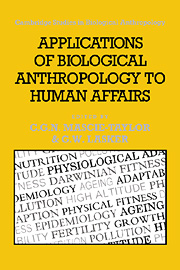Book contents
- Frontmatter
- Contents
- List of contributors
- 1 Introduction
- 2 Reproductive ecology and human fertility
- 3 Nutritional status: its measurement and relation to health
- 4 Pollution and human growth: lead, noise, polychlorobiphenyl compounds and toxic wastes
- 5 Human physiological adaptation to high-altitude environments
- 6 Darwinian fitness, physical fitness and physical activity
- 7 Human evolution and the genetic epidemiology of chronic degenerative diseases
- 8 The biology of human aging
- Index
2 - Reproductive ecology and human fertility
Published online by Cambridge University Press: 03 May 2010
- Frontmatter
- Contents
- List of contributors
- 1 Introduction
- 2 Reproductive ecology and human fertility
- 3 Nutritional status: its measurement and relation to health
- 4 Pollution and human growth: lead, noise, polychlorobiphenyl compounds and toxic wastes
- 5 Human physiological adaptation to high-altitude environments
- 6 Darwinian fitness, physical fitness and physical activity
- 7 Human evolution and the genetic epidemiology of chronic degenerative diseases
- 8 The biology of human aging
- Index
Summary
Introduction
Few fields of inquiry draw from as diverse an array of disciplines as the study of human fertility. Contributions come from sociology, public health, medicine, demography, political science, economics, and anthropology, each discipline bringing to bear its own particular perspectives and theoretical agenda. The perspective of the biological anthropologist among these others is unique in two respects: the central position of evolutionary theory and evolutionary history in anthropological thinking, and the commitment to understanding human fertility, its determinants and consequences, as part of an integrated species biology. These two elements give rise to the two primary motivations of biological anthropologists for studying human fertility.
The first motivation is to understand as fully as possible our evolutionary past, both the history of change that we and our phyletic relatives have undergone and the forces and constraints that have shaped its course. Understanding the reproductive biology of our species is fundamental to that effort, since in its essentials natural selection can be broken down into variability in the processes of birth and death. If we can fully comprehend the way in which our fertility is regulated by physiological, ecological and social mechanisms, we will be in a better position to elucidate critical junctures of human evolution, such as the transition to subsistence horticulture, the transition to cooperative hunting and gathering societies, or even the original diversion from other hominoid lines.
- Type
- Chapter
- Information
- Applications of Biological Anthropology to Human Affairs , pp. 14 - 54Publisher: Cambridge University PressPrint publication year: 1991
- 29
- Cited by



